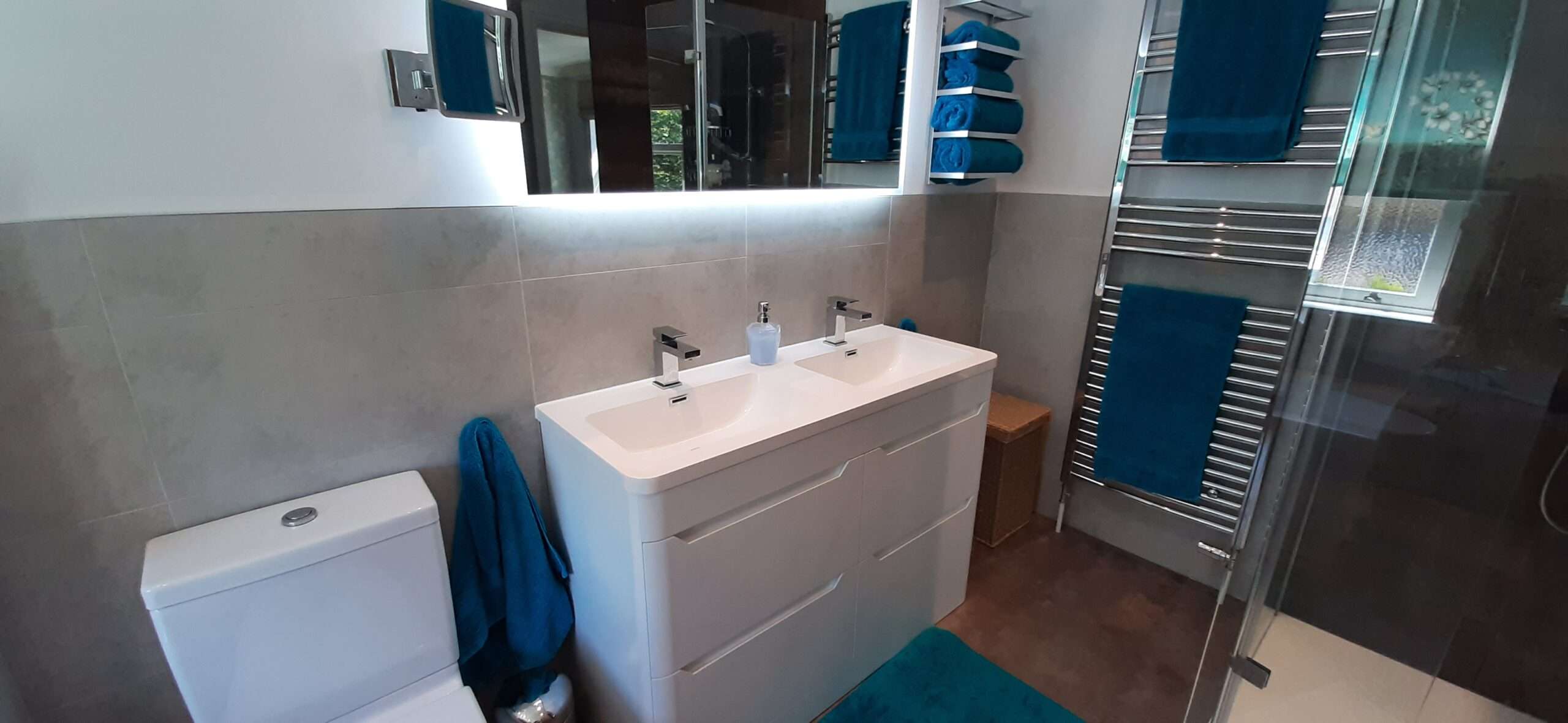
Balancing Look and Practicality in a New Bathroom
Balancing Look and Practicality in a New Bathroom
When planning a bathroom renovation, homeowners often face a common dilemma: choosing between aesthetics and functionality. While creating a visually stunning bathroom can elevate the look of your home, a design that prioritizes style over practicality may result in inconvenience and long-term maintenance issues. Ideally, your bathroom should strike the perfect balance between being beautiful and functional. Here’s how you can compare the look and practicality when it comes to designing a new bathroom and make the best decisions for your space. You should also consider what looks great in a magazine may not be practical and the quality fittings can cost a small fortune. The cheaper Chinese versions do come with compromise and that is quality and durability. Repairs in years to come can be impossible due to lack of spare parts.
1. The Role of Aesthetics: Why Looks Matter
A bathroom’s visual appeal can significantly enhance the overall ambiance of your home. A well-designed bathroom adds a touch of luxury, making everyday routines feel more enjoyable. When renovating, it’s natural to focus on selecting stylish tiles, modern fixtures, and elegant colour schemes that align with the desired look of your bathroom.
Elements like designer sinks, trendy wall tiles, high-end shower units, or custom cabinetry can give the bathroom a unique personality and wow factor. Features like recessed lighting, frameless glass shower screens, and luxurious finishes (e.g., marble countertops or brass fittings) create a high-end feel, often seen in boutique hotels or spas.
However, while style is important, basing design choices purely on appearance can lead to overlooked practical considerations, making everyday use less convenient. Dont forget the hotels do have the budgets to change the bathroom fittings on regulars basis but do you?
2. The Necessity of Practicality: Making Life Easier
A bathroom’s practicality is determined by how well it accommodates your daily needs, provides comfort, and simplifies upkeep. A functional bathroom design goes beyond just looking good; it ensures that fixtures are placed for optimal use, storage solutions are accessible, and all elements are easy to clean and maintain.
For example, the placement of the toilet, sink, and shower should allow for a comfortable flow of movement, while storage solutions should be adequate for everyday items like towels, toiletries, and cleaning supplies. Considerations like non-slip flooring, a sufficient number of electrical outlets, and easy-to-reach towel racks can enhance the bathroom’s functionality. Also consider when installing ever so popular black showers or other fittings would they stand the test of times and still look great in years to come. Yes they may look fantastic when new but after many years of fittings bathroom in Milton Keynes we know that in very hard water areas to keen them looking great is an impossible task
Practicality also extends to materials. While natural stone or wooden surfaces can look stunning, they may require sealing or specific maintenance to keep them in good condition. Opting for materials that are both attractive and easy to maintain can strike a better balance.
3. Striking the Right Balance: Key Areas to Focus On
Finding the right balance between look and practicality involves making informed choices that accommodate both aesthetics and functionality. Here are some important areas to focus on:
a. Layout and Space Planning
An appealing bathroom layout maximizes the available space without compromising on comfort. A good layout ensures that fixtures are easily accessible and there is enough room to move around without feeling cramped. For smaller bathrooms, incorporating space-saving solutions like wall-mounted sinks, compact toilets, or sliding shower doors can maintain a sleek appearance while still providing practical benefits.
Positioning the shower, bathtub, toilet, and sink in a way that creates a logical flow of movement is essential for both usability and aesthetics. Avoid overcrowding the space with fixtures or decorative elements that could hinder functionality.
b. Storage Solutions
Stylish open shelving or glass cabinets can look great, but they may not be practical if you need to store numerous items out of sight. While open shelves provide a trendy look, they can also make the space feel cluttered if not neatly arranged. In contrast, concealed storage options such as vanity units with drawers, built-in cabinets, or mirrored cabinets can provide a sleek appearance while keeping essentials organized and hidden.
Finding a balance involves combining open and closed storage solutions, so you have space to showcase decorative items without sacrificing storage for everyday necessities.
c. Choice of Materials
Certain materials look luxurious but require significant maintenance to keep them in good condition. For example, marble countertops may look stunning, but they are porous and can stain easily if not regularly sealed. Similarly, wood can add warmth and character but is susceptible to water damage if not properly treated.
On the other hand, materials like porcelain tiles, quartz countertops, or vinyl flooring provide a practical and low-maintenance option while still offering a stylish look. When choosing materials, consider how they will perform in a humid environment and how much effort you’re willing to invest in upkeep. When choosing materials there is also installation cost to take into consideration. For example tiled floor will look great but the installation cost is significantly higher than vinyl click planks.
d. Lighting
While ambient lighting can create a relaxing atmosphere, task lighting is essential for functional areas like the mirror or shower. A well-lit bathroom is both practical and visually appealing. Combining different lighting types, such as overhead, accent, and task lighting, can create the right mood while ensuring the bathroom is functional for daily tasks.
For a practical touch, consider adding dimmable lights, motion-activated lighting, or even heated, anti-fog mirrors that combine convenience with modern style.
e. Fixtures and Fittings
When it comes to fixtures like taps, showerheads, and toilets, style often competes with functionality. For instance, wall-mounted taps and rain showerheads may look modern and sleek, but their practicality depends on factors like water pressure, ease of cleaning and of course the cost of purchase and installation cost.
Choosing fittings that blend style with functionality is important. Look for fixtures that are not only visually appealing but also durable and easy to use. Opt for finishes that resist fingerprints and water spots, and ensure that the placement of these fixtures accommodates everyday needs.
4. Examples of Achieving Balance
Example 1: Small Bathrooms
In a small bathroom, functionality is often a priority due to space limitations. However, a small space can still look stylish. Consider using large, light-colored tiles to make the area feel bigger, and incorporate floating vanities or wall-mounted toilets to free up floor space. Combining these practical design choices with decorative elements like a bold accent wall or stylish light fixture can add character without overwhelming the room.
Example 2: Family Bathrooms
Family bathrooms often need to prioritize durability and storage due to frequent use. In this case, choose materials that can withstand wear and tear, such as ceramic tiles or laminate countertops. Ensure there is ample storage for each family member’s items, such as double-sink vanities with built-in cabinets. For aesthetic appeal, incorporate colour through accessories like towels or shower curtains, which can easily be updated for a fresh look.
Example 3: Luxury Bathrooms
For those who want to create a spa-like bathroom, the emphasis may be on luxury finishes and aesthetics. However, practicality should not be sacrificed. High-end materials like natural stone should be paired with proper sealing and maintenance routines. Additionally, luxury bathrooms can incorporate practical features like underfloor heating, steam showers, or smart mirrors to enhance both comfort and usability.
5. When Style and Practicality Conflict
There will be times when achieving a perfect balance isn’t possible, and compromises need to be made. In such cases, prioritize the elements that will impact your daily life the most. For example, while it may be appealing to have a freestanding bathtub as a centerpiece, if you don’t take baths often, it may be more practical to invest in a high-quality shower.
Always ask yourself whether a design choice will truly add value to your bathroom experience or if it’s purely for aesthetics. The goal is to create a space that you enjoy using and that stands up to daily demands.
Are what do we think…
When planning a new bathroom, it’s important to weigh both appearance and practicality. We have been renovating bathrooms in Milton Keynes for many years and we can give you an honest advice you what is or isn’t practical while creating a visually stunning space can add to your home’s value and personal enjoyment, a bathroom that lacks functionality can quickly become a source of frustration. By carefully considering the layout, materials, storage, lighting, and fixtures, you can design a bathroom that is as functional as it is beautiful. We work with local interior designer who will advice you on colour choices and the best fittings for the space
Striking the right balance between look and practicality ensures your bathroom not only looks impressive but also meets your everyday needs, resulting in a space that brings you satisfaction for years to come.
